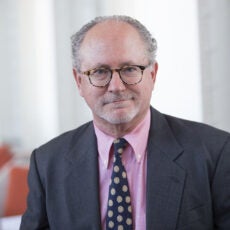
Puerto Rico’s Three Major Energy Policy Challenges
At a conference in San Juan, thought leaders gather to discuss innovation amidst crisis.
The Wharton School organized an excellent conference last week in Puerto Rico to discuss the challenges and opportunities facing the island in the wake of its fiscal crisis followed by Hurricanes Irma and Maria, which resulted in the longest blackout in U.S. history.
We were honored to be on the panel on energy, which included two of the principal local actors guiding Puerto Rico’s energy future: Jose Ortiz, the executive director of the PREPA utility, and Senator Eduardo Bhatia, the author of SB1121.
PREPA has just released the island’s first Integrated Resource Plan in two decades. The IRP envisioned a large increase in utility-owned solar and storage capacity, with three new LNG import facilities to provide transitional baseload as well as backup generation for intermittency in renewable generation. Puerto Rico’s transmission and distribution grid would be reconfigured into 8 mini-grids that could operate and respond independently to weather or other disruptions.
SB1121 has changed the long game in Puerto Rico with a number of policy changes. The new law calls for 100 percent renewable electricity by 2050, with a series of mileposts including 40 percent by 2025. It envisions a much more distributed energy system of “prosumers” creating flexible and resilient power. The policy provides for new mechanisms to nurture this transition, such as a grid interconnection protocol and accelerated permitting for rooftop solar and small-scale storage.
Many simultaneous changes are underway in Puerto Rican energy policy. We highlighted three important challenges in our panel remarks.
First, the energy regulator is important in any context but particularly during periods of change. Our PennLaw colleague Cary Coglianese explores this importance in this major report. New approaches being tested in Hawaii also point out the potential value of using exploratory, “undocketed” proceedings to develop innovative approaches to new challenges. In Puerto Rico, where a 70-year-old and largely unregulated monopoly is being transformed into a member of a more transparent and competitive energy market, such undocketed proceedings can help level the playing field of expertise and participation by new entrants.
Second, the island faces a tough challenge in appropriately balancing new investments in national gas versus renewables. Steep declines in the cost of energy storage threaten to undermine the value of natural gas as a backup generation capacity for the intermittency of solar and wind. One way to avoid locking in to investments that will become obsolete is to consider less LNG import capacity and more natural gas storage capacity. This would support near-term concerns about resilience and longer-term concerns about intermittency: emerging power-to-gas technologies might provide storage opportunities that compete with batteries.
Third, the ongoing discussion about mini-grids versus micro-grids in Puerto Rico is an example of the larger debate about the relative value of distributed versus centralized energy generation. Renewable energy is cheaper than fossil fuel energy in many parts of the U.S. right now and is likely to be cheaper everywhere—in years; not decades. However, utility-scale renewables remain two to four times cheaper than distributed renewables. But when resilience matters, such as after a major hurricane, the ability for distributed energy assets to bounce back becomes a paramount concern. Kleinman Center Visiting Scholar Jesse Jenkins and co-authors develop a new metric to guide policy through these competing valuations: The locational benefits of distributed energy compared to the opportunity cost of foregoing the scale economies of centralized energy.
These challenges and possible solutions are alive and well in Puerto Rican energy policy debates, thanks to ambitious new visions and a vibrant politics. The island may well become a hotbed of innovation among the states and territories of the U.S. The Kleinman Center is grateful to have been a part of the Wharton conference and looks forward to future opportunities to contribute.
Mark Alan Hughes
Director EmeritusMark Alan Hughes is director emeritus of the Kleinman Center. During his time as faculty director, he led the Center and wrote on topics ranging from deep decarbonization to the future of Philadelphia’s energy landscape.

